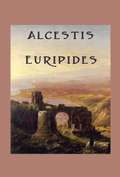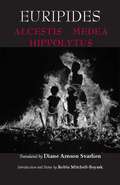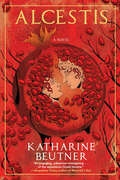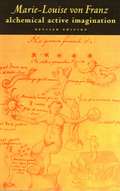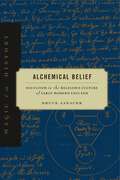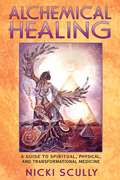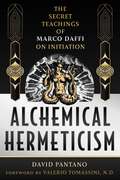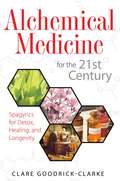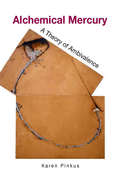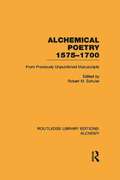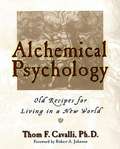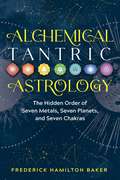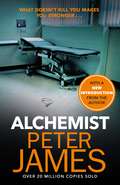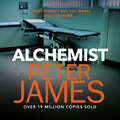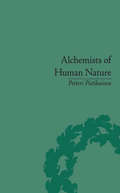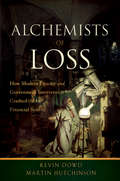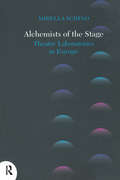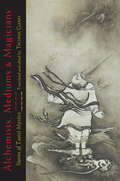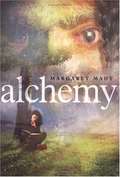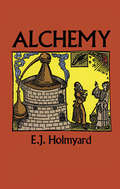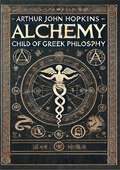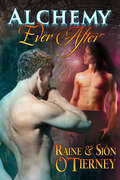- Table View
- List View
Alcestis
by Euripides"The Alcestis would hardly confirm its author's right to be acclaimed 'the most tragic of the poets.' It is doubtful whether one can call it a tragedy at all. Yet it remains one of the most characteristic and delightful of Euripidean dramas, as well as, by modern standards, the most easily actable. And I notice that many judges who display nothing but a fierce satisfaction in sending other plays of that author to the block or the treadmill, show a certain human weakness in sentencing the gentle daughter of Pelias." So begins the introduction to the Alcestis by Euripides.
Alcestis, Medea, Hippolytus
by Euripides Diane Arnson Svarlien Robin Mitchell-BoyaskThis new volume of three of Euripides' most celebrated plays offers graceful, economical, metrical translations that convey the wide range of effects of the playwright's verse, from the idiomatic speech of its dialogue to the high formality of its choral odes.
Alcestis: A Novel
by Katharine BeutnerIn Greek myth, Alcestis is known as the ideal wife; she loved her husband so much that she died and went to the underworld in his place. In this vividly-imagined debut, Katharine Beutner gives voice to the woman behind the ideal and reveals the part of the story that's never been told: What happened to Alcestis in the three days she spent in the underworld?
Alchemical Active Imagination: Revised Edition
by Marie-Louise von FranzAlthough alchemy is popularly regarded as the science that sought to transmute base physical matter, many of the medieval alchemists were more interested in developing a discipline that would lead to the psychological and spiritual transformation of the individual. C. G. Jung discovered in his study of alchemical texts a symbolic and imaginal language that expressed many of his own insights into psychological processes. In this book, Marie-Louise von Franz examines a text by the sixteenth-century alchemist and physician Gerhard Dorn in order to show the relationship of alchemy to the concepts and techniques of analytical psychology. In particular, she shows that the alchemists practiced a kind of meditation similar to Jung's technique of active imagination, which enables one to dialogue with the unconscious archetypal elements in the psyche. Originally delivered as a series of lectures at the C. G. Jung Institute in Zurich, the book opens therapeutic insights into the relations among spirit, soul, and body in the practice of active imagination.
Alchemical Belief: Occultism in the Religious Culture of Early Modern England (Magic in History)
by Bruce JanacekWhat did it mean to believe in alchemy in early modern England? In this book, Bruce Janacek considers alchemical beliefs in the context of the writings of Thomas Tymme, Robert Fludd, Francis Bacon, Sir Kenelm Digby, and Elias Ashmole. Rather than examine alchemy from a scientific or medical perspective, Janacek presents it as integrated into the broader political, philosophical, and religious upheavals of the first half of the seventeenth century, arguing that the interest of these elite figures in alchemy was part of an understanding that supported their national—and in some cases royalist—loyalty and theological orthodoxy. Janacek investigates how and why individuals who supported or were actually placed at the traditional center of power in England’s church and state believed in the relevance of alchemy at a time when their society, their government, their careers, and, in some cases, their very lives were at stake.
Alchemical Belief: Occultism in the Religious Culture of Early Modern England (Magic in History)
by Bruce JanacekWhat did it mean to believe in alchemy in early modern England? In this book, Bruce Janacek considers alchemical beliefs in the context of the writings of Thomas Tymme, Robert Fludd, Francis Bacon, Sir Kenelm Digby, and Elias Ashmole. Rather than examine alchemy from a scientific or medical perspective, Janacek presents it as integrated into the broader political, philosophical, and religious upheavals of the first half of the seventeenth century, arguing that the interest of these elite figures in alchemy was part of an understanding that supported their national—and in some cases royalist—loyalty and theological orthodoxy. Janacek investigates how and why individuals who supported or were actually placed at the traditional center of power in England’s church and state believed in the relevance of alchemy at a time when their society, their government, their careers, and, in some cases, their very lives were at stake.
Alchemical Healing: A Guide to Spiritual, Physical, and Transformational Medicine
by Nicki ScullyCombines shamanism, alchemy, and energy medicine to create a unique healing modality• Explores how to turn the base substance of who you are--the dark mystery of your subconscious--into the alchemical gold of knowledge and enlightenment• Includes techniques of distant healing and working with power animals and plant, mineral, and elemental spirits• Shows how to utilize the Universal Life Force to reawaken inherent healing abilitiesAlchemical Healing brings together innovative techniques of shamanism and energetic healing with the principles of alchemy, creating a practical form of physical healing, therapeutic counseling, and spiritual growth. The author provides ways to integrate spirit and matter, to develop communications between divinity and humanity, to retrieve knowledge, and to influence physical reality in order to achieve healing and transformation. With simple directions, readers are guided through attunements and empowerments that access the Universal Life Force energy and a five-element system for healing themselves and others. They learn powerful techniques, such as psychic surgery, distant healing, and how to work with power animals and plant, mineral, and elemental spirit guides. Alchemical Healing presents a sacred journey into the most profound principles and mysteries of creation. It offers both an art form and a spiritual path that develops one’s ability to co-create the future with the wisdom of the spirit world.
Alchemical Hermeticism: The Secret Teachings of Marco Daffi on Initiation
by David Pantano• Presents Daffi&’s writings on unique and unusual experiences from five decades of alchemical and hermetic practice, available for the first time in English• Offers a view of Daffi&’s &“Inner Laboratory&” and his pioneering investigations into consciousness, past-life regression, Hermetic healing, and divination• Offers a psychological portrait of Daffi through writings by initiates, artists, and scholars who knew or had firsthand knowledge of the BaronFollowing the path set by renowned alchemist Giuliano Kremmerz, Marco Daffi was one of the most interesting and controversial protagonists of magical Hermeticism in the 20th century, a master initiate who illuminated the more esoteric aspects of Hermetic practice in terms of initiation, gnosis, eros, divination, and consciousness.In this comprehensive look at the man born Baron Ricciardo Ricciardelli, yet better known by his spiritual name of Marco Daffi, historian and researcher David Pantano presents Daffi&’s writings on some of the most unique and unusual topics within alchemical Hermeticism, available for the first time in English.Through his visionary writings, Daffi elucidates firsthand accounts of "initiatory experience" and the inner visions of Hermetic practices, supported by relevant experiential praxis. Readers are able to enter Daffi&’s "Inner Laboratory" and experience his pioneering investigations into the numinal or interdimensional aspects of consciousness. Daffi details the descensus ad inferno he took into the dark cavernous recesses of past-life regression for purposes of Hermetic healing. His writings also reveal his practical applications of oracular-modes of consciousness, especially by exercising his considerable mediumistic capabilities.Exploring the more human side of Daffi that influenced his work, Pantano shares biographical information and writings from initiates, artists, and scholars who knew of the Baron. These never-before-translated writings provide context and additional depth for the insights that permeate Daffi&’s alchemical and magical work and philosophy. Pantano also includes Daffi&’s own account of the infamous "Trial of the Magus," which pitted him against the grandson of his teacher, Giuliano Kremmerz, at the height of Italy&’s fascist era.Providing an inside view of the magus at work, a glimpse into the far-reaching spiritual horizon of a man who explored the depths of the astral realm and the most occult aspects of alchemy and Hermeticism, this book allows the reader to see with an initiate&’s eyes the kaleidoscopic prism of Daffi&’s expansive vision of reality.
Alchemical Medicine for the 21st Century: Spagyrics for Detox, Healing, and Longevity
by Clare Goodrick-ClarkeUsing the ancient art of spagyrics for treatment of today’s health problems • Contains detailed indications for using alchemical preparations therapeutically • Shows how the essences work holistically to heal the mind, body, and spirit with the energetic qualities of the plant • Provides effective therapy for a wide range of physical and mental disorders Spagyrics is a branch of medicinal alchemy that enhances the healing properties already existing in plants. Developed by Paracelsus, the magus and alchemist of the early 16th century, spagyrics is a holistic therapy that promotes healing at all levels of the human being--body, soul, and spirit. Spagyric essences harness the dynamic life force in plants that triggers recovery from the energetic imbalance of illness. The harmonizing and balancing qualities of spagyric essences differ from other plant remedies and aromatherapy oils because they not only include the plant’s energetic information but also incorporate the salt of the plant, from which all toxic matter has been purged. The preparation of this alchemical medicine makes it possible to capture the full therapeutic spectrum of plants, including the cosmic energies they have absorbed. Alchemical Medicine for the 21st Century contains detailed indications for using these alchemical preparations to treat both physical and mental disorders. The author shows, for example, that the tincture made from dandelion is especially potent on liver-related ailments and also raises the spirit and frees the patient from anger and bitterness. The immune system is also boosted by this essence, providing tonic effects for allergy sufferers. The author, a homeopath since 2000, also shows how these spagyric essences can be potentized homeopathically.
Alchemical Mercury: A Theory of Ambivalence
by Karen PinkusPinkus (Italian, French and comparative literature, University of Southern California) takes the reader on a somewhat quixotic journey through the many visions of alchemy from antiquity to the present. She points out that the derivation of the word is uncertain. But this is appropriate since the definition of alchemy is also murky. Is it science or magic? Is it something as crass as turning lead into gold, or as rarified as a spiritual rebirth? While alchemies have existed for centuries, Pinkus spends the most time on the alchemical centuries, roughly (for nothing is definite) 1500-1800. She finds alchemical thoughts in Goethe, Lavoisier, the Rosicrucians and Marx among many others. Her own philosophy, as expressed through the nebulous, contradictory attitudes of thinkers toward the concept of alchemy is given with intelligence and humor. Alchemy is a metaphor but its shifting meaning is the root of this exploration into ambivalence. Annotation ©2010 Book News, Inc. , Portland, OR (booknews. com)
Alchemical Poetry, 1575-1700: From Previously Unpublished Manuscripts (Routledge Library Editions: Alchemy #Vol. 5)
by Robert M. SchulerOf interest to interdisciplinary historians as well as those in various other fields, this book presents the first publication of 14 poems ranging from 12 to 3,000 lines. The poems are printed in the chronological order of their composition, from Elizabethan to Augustan times, but nine of them are verse translations of works from earlier periods in the development of alchemy. Each has a textual and historical introduction and explanatory note by the Editor. Renaissance alchemy is acknowledged as an important element in the histories of early modern science and medicine. This book emphasises these poems’ expression of and shaping influence on religious, social and political values and institutions of their time too and is a useful reference work with much to offer for cultural studies and literary studies as well as science and history.
Alchemical Psychology
by Thom F. CavalliAlchemical practices have been reborn in our contemporary world under the rubric of Jungianism, transpersonal psychology, or depth psychology. But in Alchemical Psychology, Thom F. Cavalli, Ph. D. , takes us directly to the source--and on a wonderful adventure into the true nature of our hearts and minds. In a book that sparkles with verve, life, and practicality, Dr. Cavalli explains how alchemy was one of humankind's earliest efforts to transform the nature of consciousness. What little-known or underground arts did alchemists practice in pursuit of self-transformation--and how can they enrich us today? Using the same practices that he employs with patients, Dr. Cavalli offers readers a plethora of personal exercises that, among other things, enables them to "type" themselves according to ancient alchemical identifiers of nature and personality. He then provides practices that can help free them from the grip of familiar problems and foster true personal growth. Beautifully illustrated with medieval prints from the alchemical tradition, Alchemical Psychology gives readers both a richer understanding of their own natures and of the traditions on which many of our modern therapies are based. .
Alchemical Tantric Astrology: The Hidden Order of Seven Metals, Seven Planets, and Seven Chakras
by Frederick Hamilton Baker• Shows how the astrological cycle around the signs of the zodiac represents the alchemical transformation of consciousness and chakra awakening • Expands the meaning of each astrological sign based on its association with the chakras and the alchemical transmutation cycle from lead to gold • Offers sample chart analyses to show how you can discover your spiritual challenges and opportunities Demonstrating the connections between astrology, alchemy, and yoga, Frederick Baker reveals how he discovered their correspondences by rotating the natural order of the zodiac, placing Aquarius and Capricorn at the bottom and Cancer and Leo at the top, to reflect the alchemical order of metals from lead to gold. is Alchemical Tantric Arrangement then revealed a corresponding alchemical order of the seven traditional planets--from Saturn (lead) to Sun (gold)--and also aligned with the seven chakras and the three major energy channels (nadis) of the Tantric yoga system, including the channel through which Kundalini energy rises from root chakra to crown chakra. Baker uses these rediscovered correspondences to expand the meaning of each astrological sign based on their association with the chakras, the alchemical transmutation cycle from lead to gold, and the wisdom of ancient myth. He also offers expanded meanings for each chakra in association with the twelve signs of the zodiac and their ruling planets as well as new insights into the influence of Chiron and Eris. The author provides a complete analysis of his own birth chart as well as Alchemical Tantric Astrology insights into significant events over the past few decades, including the intense changes of 2020. Baker&’s revolutionary new take on our individual spiritual journeys shows how the astrological cycle around the signs of the zodiac represents the alchemical and Tantric transformation of consciousness and the natural path of spiritual unfolding.
Alchemist
by Peter JamesWhat doesn't kill you makes you stronger...Monty Bannerman's father is a leading genetic scientist, and Nobel Prize winner, whose company has just been taken over by what will soon be the world's biggest pharmaceutical giant. He had some misgivings about their company ethics - but ultimately, he needs their money, and they need his mind. Then a journalist comes to Monty's door, with a far-fetched story about the pharmaceutical company. She doesn't believe what she's being told for a moment - but within a few short weeks, events are making the apparently fantastic claims look horrifyingly like the truth.Behind the respectable facade of the multi-national company which calls itself the 'World's Most Caring Company' lies an outrage against the whole human race...'Peter James is getting better with every book.' Times'Peter James is one of the best crime writers in the business.' Karin SlaughterRead more from the multi-million copy bestselling author of the Roy Grace novels:Possession DreamerSweet Heart Twilight Prophecy Host Alchemist Denial The Truth Faith * Each Peter James novel can be read as a standalone*
Alchemist
by Peter JamesWhat doesn't kill you makes you stronger...Monty Bannerman's father is a leading genetic scientist, and Nobel Prize winner, whose company has just been taken over by what will soon be the world's biggest pharmaceutical giant. He had some misgivings about their company ethics - but ultimately, he needs their money, and they need his mind. Then a journalist comes to Monty's door, with a far-fetched story about the pharmaceutical company. She doesn't believe what she's being told for a moment - but within a few short weeks, events are making the apparently fantastic claims look horrifyingly like the truth.Behind the respectable facade of the multi-national company which calls itself the 'World's Most Caring Company' lies an outrage against the whole human race...'Peter James is getting better with every book.' Times'Peter James is one of the best crime writers in the business.' Karin SlaughterRead more from the multi-million copy bestselling author of the Roy Grace novels:Possession DreamerSweet Heart Twilight Prophecy Host Alchemist Denial The Truth Faith * Each Peter James novel can be read as a standalone*
Alchemist
by Peter JamesWhat doesn't kill you makes you stronger...Monty Bannerman's father is a leading genetic scientist, and Nobel Prize winner, whose company has just been taken over by what will soon be the world's biggest pharmaceutical giant. He had some misgivings about their company ethics - but ultimately, he needs their money, and they need his mind. Then a journalist comes to Monty's door, with a far-fetched story about the pharmaceutical company. She doesn't believe what she's being told for a moment - but within a few short weeks, events are making the apparently fantastic claims look horrifyingly like the truth.Behind the respectable facade of the multi-national company which calls itself the 'World's Most Caring Company' lies an outrage against the whole human race...'Peter James is getting better with every book.' Times'Peter James is one of the best crime writers in the business.' Karin SlaughterRead more from the multi-million copy bestselling author of the Roy Grace novels:Possession DreamerSweet Heart Twilight Prophecy Host Alchemist Denial The Truth Faith * Each Peter James novel can be read as a standalone*
Alchemists of Human Nature: Psychological Utopianism in Gross, Jung, Reich and Fromm
by Petteri PietikainenA study of Modernist utopias of the mind. This book examines the psychodynamic writings of Otto Gross, C G Jung, Wilhelm Reich and Erich Fromm. It argues, utopianism became increasingly important to the fundamental ambitions of all four thinkers, and places the 'utopian impulse' with the historical context of the early twentieth century.
Alchemists of Loss
by Martin Dowd Kevin K. HutchinsonAn engaging look at how modern finance almost destroyed our global economy Over the last thirty years, capital markets have been restructured through the tenets of modern finance. This has been enormously profitable for the financial services sector. However, these innovations, coupled with unsound risk and regulatory practices have proved disastrous for the global economy. In a clear and accessible style, ex-investment banker and financial journalist Martin Hutchinson, and highly respected academic, Kevin Dowd show how modern finance combined with easy money threatened to bring down the world financial system. At the heart of the book is modern finance as a U. S. invention, the theories and practices associated with them, and the changes they made in business models and risk management on Wall Street and other major financial centers. Breaks down the events involved in the 2007-08 financial collapse Reveals how botched policy response made a bad situation worse Focuses on lessons that the practice of finance must learn from recent events The Alchemists of Loss will help you to understand how our financial system crashed and show you what it will take to make sure this won't happen again as we move forward.
Alchemists of the Stage: Theatre Laboratories in Europe (Routledge Icarus Ser.)
by Mirella SchinoWhat is a theatre laboratory? Why a theatre laboratory? This book tries to answer these questions focusing on the experiences and theories, the visions and the techniques, the differences and similarities of European theatre laboratories in the twentieth century. It studies in depth the Studios of Stanislavski and Meyerhold, the school of Decroux, the Teatr Laboratorium of Jerzy Grotowski and Ludwik Flaszen, as well as Eugenio Barba's Odin Teatret. Theatre laboratories embody a theatre practice which defies the demands and fashions of the times, the usual ways of production and the sensible functions which stage art enjoys in our society. It is a theatre which refuses to be only art and whose radical research forges new conditions with a view to changing both the actor and the spectator. This research transforms theatrical craft into a laboratory which has been compared to the laboratory of the alchemists, who worked not on material but on substance. The alchemists of the stage did not operate only on forms and styles, but mainly on the living matter of the theatre: the actor, seen not just as an artist but above all as a representative of a new human being. Laboratory theatres have rarely been at the centre of the news. Yet their underground activity has influenced theatre history. Without them, the same idea of theatre, as it has been shaped in the course of the twentieth century, would have been different. In this book Mirella Schino recounts, as in a novel, the vicissitudes of a group of practitioners and scholars who try to uncover the technical, political and spiritual perspectives behind the word laboratory when applied to the theatre.
Alchemists, Mediums, and Magicians: Stories of Taoist Mystics
by Thomas ClearyHere is an introduction to the magical and mystical realm of Taoism through biographical and historical sketches of Taoist adepts over two thousand years. This panoramic view of the many faces of Taoism and its intimate connection with Chinese culture and society includes intriguing accounts of the Taoist secret societies that carried out mystical exercises and powerful consciousness-altering techniques, including sensory deprivation, incantation, visualization, and concentration.This collection of sketches, compiled by Zhang Tianyu, a Taoist priest in the fourteenth century, and translated by renowned translator Thomas Cleary, portrays more than one hundred remarkable individuals from the eleventh century B.C.E. to the thirteenth century C.E. It introduces us to a broad and fascinating range of personalities including philosophers and scholars, magicians and mediums, alchemists and physicians, seers and soothsayers, and artists and poets, among many others.Cleary's expert translation and informative footnotes make this collection a lively and accessible read.
Alchemy
by Margaret MahySeventeen-year-old Roland discovers that an unpopular girl in his school is studying alchemy and finds that their destiny is linked with that of a power-hungry magician.
Alchemy
by Michael GandyPatty Sue, a little girl in a small Southern town, finds undeveloped film in an old camera and has a friend at the local newspaper develop it. When a feature piece is published regarding the depicted parade from three decades past, threatening events indicate someone quite powerful does not want whatever the photos show investigated further.
Alchemy (Dover Books on Engineering)
by E. J. HolmyardAlchemy is thought to have originated over 2000 years ago in Hellenic Egypt, the result of three converging streams: Greek philosophy, Egyptian technology and the mysticism of Middle Eastern religions. Its heyday was from about 800 A.D. to the middle of the seventeenth century, and its practitioners ranged from kings, popes, and emperors to minor clergy, parish clerks, smiths, dyers, and tinkers. Even such accomplished men as Roger Bacon, Thomas Aquinas, Sir Thomas Browne and Isaac Newton took an interest in alchemical matters.In its search for the "Philosopher's Stone" that would transmute base metals into silver and gold, alchemy took on many philosophical, religious and mystical overtones. These and many other facets of alchemy are explored with enormous insight and erudition in this classic work. E. J. Holmyard, a noted scholar in the field, begins with the alchemists of ancient Greece and China and goes on to discuss alchemical apparatus, Islamic and early Western alchemy; signs, symbols, and secret terms; Paracelsus; English, Scottish and French alchemists; Helvetius, Price, and Semler, and much more.Ranging over two millennia of alchemical history, Mr. Holmyard shows how, like astrology and witchcraft, alchemy was an integral part of the pre-scientific moral order, arousing the cupidity of princes, the blind fear of mobs and the intellectual curiosity of learned men. Eventually, however, with the advent and ascension of the scientific method, the hopes and ideas of the alchemists faded to the status of "pseudo-science." That transformation, as well as alchemy's undeniable role as a precursor of modern chemistry, are brilliantly illuminated in this book. Students of alchemy, chemistry, the history of science, and the occult, plus anyone interested in the origin and evolution of one of mankind's most enduring and influential myths, will want to have a copy of this masterly study.
Alchemy Child of Greek Philosophy
by Arthur John HopkinsAlchemy Child of Greek Philosophy by Arthur John Hopkins is an illuminating exploration of the ancient practice of alchemy, tracing its philosophical roots back to the intellectual traditions of ancient Greece. This scholarly work delves into the intricate connections between Greek philosophical thought and the mystical, transformative art of alchemy, offering readers a deep understanding of how these two domains influenced and shaped one another.Hopkins, a distinguished scholar, meticulously examines the evolution of alchemical thought, demonstrating how the early Greek philosophers, such as Thales, Heraclitus, and Plato, laid the groundwork for the principles and practices that would later define alchemy. Through a comprehensive analysis of historical texts, philosophical doctrines, and alchemical writings, he unveils the profound ways in which Greek philosophy provided the conceptual framework for alchemical theory and experimentation.The book delves into key concepts such as the four elements, the notion of prima materia, and the process of transmutation, illustrating how these ideas were adapted and expanded upon by alchemists throughout history. Hopkins also explores the symbolic and metaphorical language of alchemy, shedding light on the allegorical representations and mystical interpretations that characterized this enigmatic discipline.Alchemy Child of Greek Philosophy is not just a historical study; it is also a philosophical inquiry that invites readers to reflect on the nature of knowledge, transformation, and the quest for understanding the mysteries of the universe. Hopkins' engaging prose and thorough research make this book an essential read for anyone interested in the history of science, philosophy, and the esoteric traditions that have shaped human thought.This work stands as a testament to the enduring legacy of Greek philosophy and its profound impact on the development of alchemy. Hopkins' insightful analysis and captivating narrative provide a rich and nuanced perspective on the symbiotic relationship between these two fields, making Alchemy Child of Greek Philosophy a valuable addition to the libraries of scholars, historians, and curious minds alike.
Alchemy Ever After
by Raine O'Tierney Siôn O'TierneyThe city of New Alexandria is filled with powerful magicians-in-training and mechanical follies, the world's largest library, and marvels beyond compare. The allure of this modern metropolis draws young people from all over the world, but Idrian has come instead for the opportunity to learn the new art of alchemy. He's been taken as an apprentice by Maketh, a scholar experimenting with new ways to combine technology and the ancient mystic arts. Together they've animated a living ice sculpture. Idrian cannot wait to unveil the sculpture alongside the other wonders at the annual Spring Festival. After witnessing his master in a passionate embrace with another student, Idrian's mind drifts to things beyond alchemy. And when a warm touch accidentally awakens the consciousness within the living sculpture, Idrian learns firsthand about physicality and the magic of passion.
